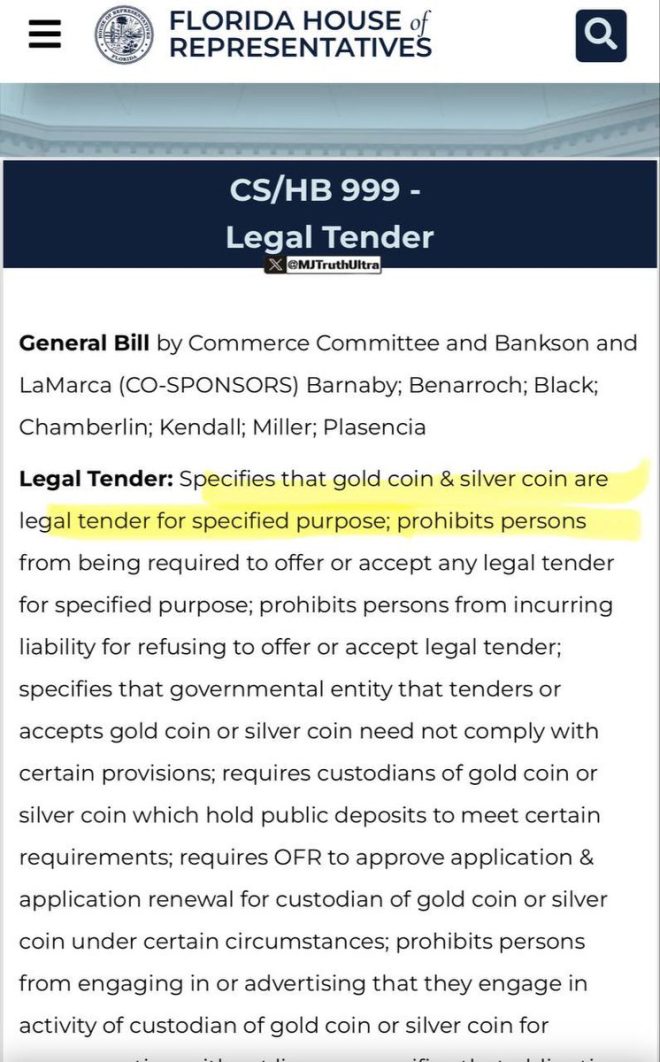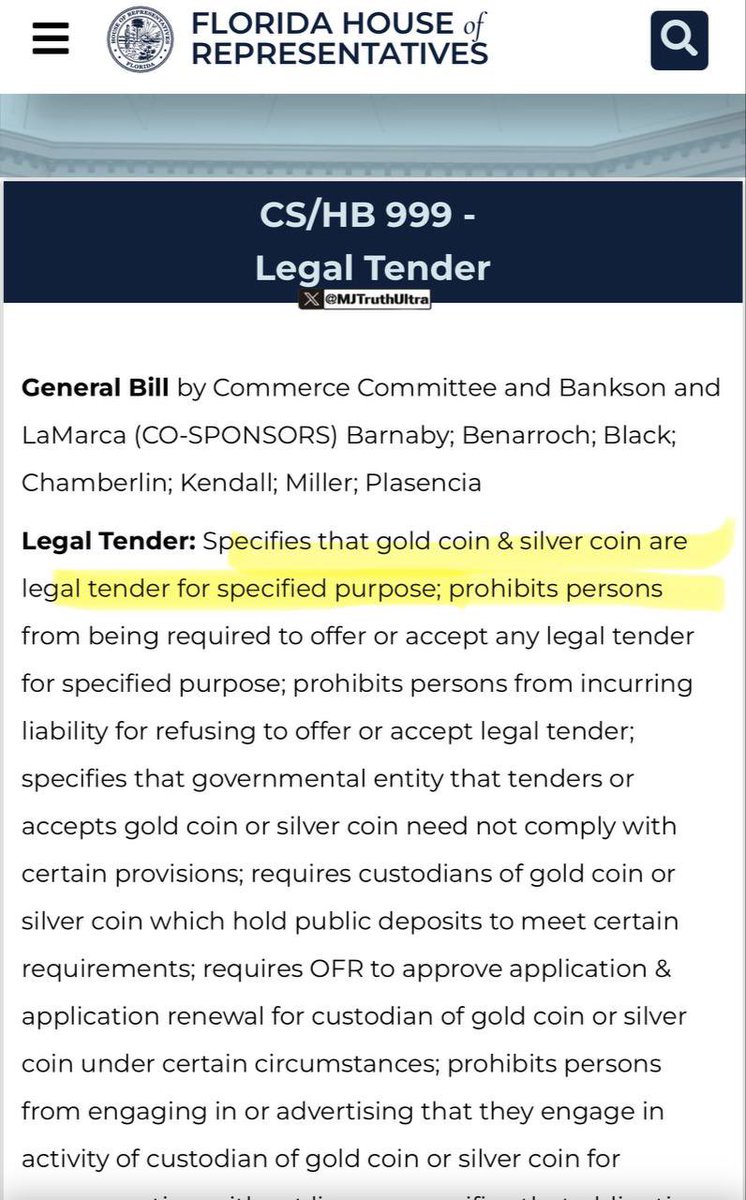
Florida house Passes HB 999: Gold and Silver Designated as Legal Tender
In a significant legislative move, the Florida House of Representatives has passed House Bill 999 (HB 999), which designates gold and silver as legal tender in the state. This groundbreaking decision has the potential to reshape the financial landscape in Florida and align with constitutional principles, as outlined in Article I, Section 10 of the U.S. Constitution.
Understanding HB 999
HB 999 is a pivotal piece of legislation that recognizes the intrinsic value of precious metals. By officially designating gold and silver as legal tender, Florida aims to provide its citizens with an alternative means of conducting transactions, especially in times of economic uncertainty. This move is part of a broader trend across the United States, where states are increasingly looking to gold and silver as viable forms of currency.
The bill emphasizes the importance of sound money principles, advocating for a financial system that is not solely reliant on fiat currency. As inflation continues to erode the purchasing power of the dollar, many people are seeking stability in tangible assets. By allowing gold and silver to be used for transactions, Florida is responding to the growing demand for financial security.
The Constitutional Basis for Legal Tender
One of the core arguments for passing HB 999 is its alignment with the U.S. Constitution. Article I, Section 10 specifically states that “No State shall … make any Thing but gold and silver Coin a Tender in Payment of Debts.” This foundational principle underscores the historical significance of gold and silver as money, which dates back thousands of years.
- YOU MAY ALSO LIKE TO WATCH THIS TRENDING STORY ON YOUTUBE. Waverly Hills Hospital's Horror Story: The Most Haunted Room 502
By reintroducing these precious metals into the financial system, Florida is not only adhering to constitutional mandates but also embracing a time-tested method of commerce. This legal designation could empower Floridians to engage in trade using gold and silver without the fear of their value depreciating due to inflation or economic instability.
The Implications of Designating Gold and Silver
The passage of HB 999 could have several implications for Florida’s economy:
- Enhanced Economic Resilience: By allowing gold and silver as legal tender, Florida could create a more resilient economy that can withstand fluctuations in the fiat currency system. This would provide citizens with a safeguard against inflation and economic downturns.
- Investment in Precious Metals: The new law may encourage more individuals to invest in gold and silver, leading to a potential increase in demand for these metals. As people recognize the value of diversifying their assets, the market for precious metals may experience growth.
- Tax Implications: The legislation may also lead to discussions about the taxation of precious metals transactions. As gold and silver become more common in everyday transactions, lawmakers will need to consider how to handle sales tax and capital gains tax related to these assets.
- Educational Opportunities: The recognition of gold and silver as legal tender opens avenues for educational initiatives focused on financial literacy and the importance of sound money. Floridians may benefit from programs that teach them about the value of precious metals and how to incorporate them into their financial strategies.
Public Reaction and Future Considerations
The passage of HB 999 has garnered mixed reactions from the public and financial experts. Proponents argue that it is a necessary step towards financial independence and stability, while critics caution that the practical implementation of such a system may face challenges.
Moreover, the long-term effects of this legislation are still uncertain. Will businesses readily accept gold and silver? How will consumers adapt to this new form of currency? These questions will need to be addressed as the law is implemented and as Florida navigates its new financial landscape.
Conclusion
The passing of HB 999 in Florida represents a significant shift in how currency is perceived and utilized within the state. By designating gold and silver as legal tender, Florida is not only adhering to constitutional principles but also responding to the growing demand for alternative forms of currency in an increasingly uncertain economic climate.
As the implications of this legislation unfold, it will be essential for both lawmakers and citizens to navigate the complexities of integrating precious metals into the financial system. Florida’s bold move could serve as a model for other states considering similar legislation, potentially paving the way for a broader acceptance of gold and silver as viable forms of currency across the United States.
In summary, the passing of HB 999 marks a transformative moment in Florida’s approach to currency and economic stability, making gold and silver not just commodities but integral components of the state’s financial future.

Florida is turning Green into GOLD
The Florida House of Representatives just passed HB 999, which designates gold and silver as legal tender in Florida
• The bill aligns with constitutional principles, as Article I, Section 10 of the U.S. Constitution states that only… pic.twitter.com/zYlmxiQufx
— MJTruthUltra (@MJTruthUltra) April 23, 2025
Florida is Turning Green into GOLD
If you’ve been following the latest legislative trends, you might’ve caught wind of some exciting news from the Sunshine State. Recently, the Florida House of Representatives passed HB 999, marking a significant shift in how currency might be viewed in the state. The bill designates gold and silver as legal tender in Florida, which has sparked quite a conversation among residents and financial experts alike.
Understanding HB 999: What’s in the Bill?
At its core, HB 999 aims to recognize gold and silver as legitimate forms of currency. This move aligns with the constitutional principles laid out in Article I, Section 10 of the U.S. Constitution, specifying that only gold and silver can serve as legal tender. The implications of this legislation could reshape the financial landscape in Florida significantly.
But what does it mean for everyday Floridians? For one, it introduces an alternative to the traditional fiat currency we’re used to, which can be subject to inflation and other economic fluctuations. By allowing gold and silver as legal tender, Floridians may feel a bit more secure about their wealth preservation.
The Historical Context of Precious Metals as Currency
Historically, gold and silver have been the backbone of currency systems worldwide. For thousands of years, these precious metals have held intrinsic value, making them a trusted medium of exchange. Even in modern times, many investors view gold and silver as a hedge against economic instability.
By reinstating these metals as legal tender, Florida is paying homage to a time when currency was more tangible. In a world increasingly dominated by digital transactions and cryptocurrencies, this move might feel like a breath of fresh air for those who prefer the old-school methods of money management.
The Economic Implications of Designating Gold and Silver as Legal Tender
The economic implications of HB 999 are vast. First and foremost, it could encourage a new wave of investment in precious metals. If residents know they can use gold and silver for everyday transactions, they might be more inclined to purchase and hold these assets.
Additionally, this legislation could boost local economies. Businesses might start accepting gold and silver in payment, creating a unique marketplace for those who prefer these forms of currency. Imagine walking into your favorite local shop and paying with a silver coin instead of cash! It’s a fascinating concept that could foster a unique sense of community and financial independence.
Aligning with Constitutional Principles
One of the most compelling arguments for this bill is its alignment with constitutional principles. As mentioned earlier, Article I, Section 10 of the U.S. Constitution states that only gold and silver can be used as legal tender. By passing HB 999, Florida is taking a stand for what many believe to be a fundamental right.
Supporters argue that this move restores fiscal responsibility and accountability in government spending. With the continued devaluation of the dollar and rampant inflation, many see this as a necessary step to protect citizens’ wealth from government mismanagement.
Critics of the Bill: Concerns and Challenges
While there are many supporters of HB 999, it’s essential to consider the criticisms and challenges that come with such a significant change. Critics argue that designating gold and silver as legal tender could complicate everyday transactions. Not everyone is equipped or willing to carry around precious metals for purchases, and the logistics of pricing goods and services in terms of these metals could prove challenging.
Furthermore, there are concerns about the volatility of gold and silver prices. Unlike fiat currency, which is relatively stable, the value of precious metals can fluctuate dramatically. This uncertainty could lead to confusion and complications for businesses and consumers alike.
The Future of Currency in Florida
So, what does the future hold for currency in Florida? The passage of HB 999 could be just the beginning. If successful, other states might follow suit, creating a ripple effect across the nation. The idea of using gold and silver as legal tender could lead to broader discussions about monetary policy and the role of fiat currency in our economy.
Moreover, the public’s reception of this bill will likely shape its future. If Floridians embrace the idea of using precious metals, we could see a burgeoning market for gold and silver, with more businesses willing to accept these forms of payment.
How Floridians Can Prepare for This Change
If you’re a resident of Florida, you might be wondering how to prepare for this change. Here are some steps to consider:
1. **Educate Yourself**: Understanding the value of gold and silver and how they can be used as currency will be crucial. Look into local dealers and learn about the purchasing process.
2. **Invest in Precious Metals**: If you’re considering using gold and silver as legal tender, it might make sense to invest in these metals. Start small and gradually build your collection.
3. **Stay Informed**: Keep up with news regarding HB 999 and its implementation. Understanding the practical aspects of using gold and silver in daily transactions will be important.
4. **Talk to Local Businesses**: Engage with local business owners about their stance on accepting gold and silver. This dialogue can help pave the way for a smoother transition.
The Broader Implications of Gold and Silver as Legal Tender
Beyond Florida, the implications of designating gold and silver as legal tender could resonate throughout the United States and beyond. It could set a precedent for other states to reconsider their monetary policies and the role of precious metals in the economy.
Moreover, it could lead to a resurgence of interest in sound money principles, where currency is backed by tangible assets rather than relying solely on government trust. This shift could foster a more stable economic environment, where individuals feel empowered to take control of their financial futures.
Conclusion: A New Dawn for Currency in Florida
The Florida House of Representatives’ passing of HB 999 is a bold move towards reimagining how currency functions in everyday life. As the state embraces gold and silver as legal tender, it opens the door to a new era of financial freedom and independence for its residents. Whether you’re excited about the possibilities or a bit skeptical, there’s no denying that this legislation will spark conversations about money, value, and the future of currency in the United States.
Stay tuned, because Florida is definitely turning green into gold, and that’s something worth keeping an eye on!
